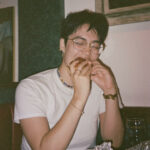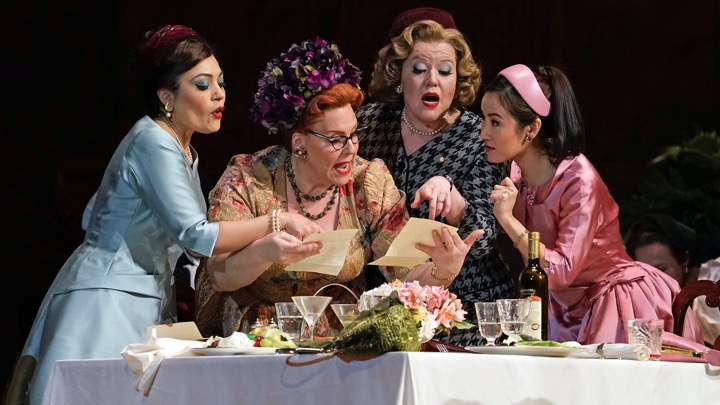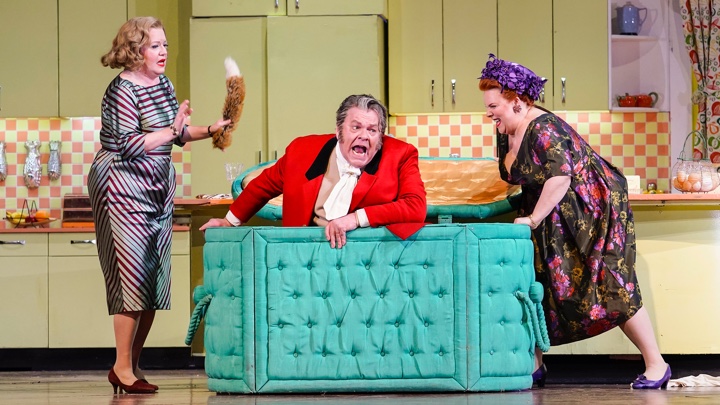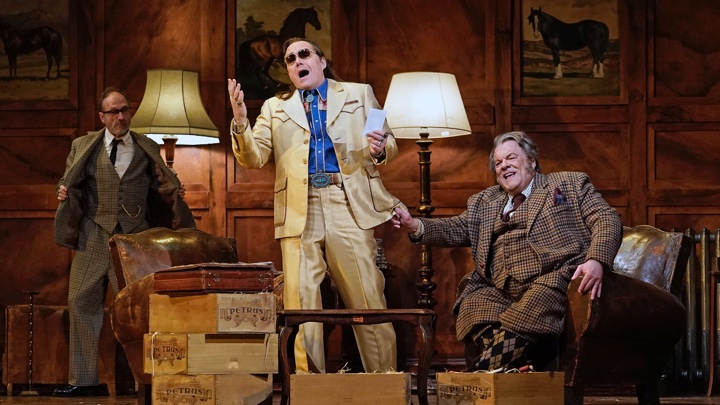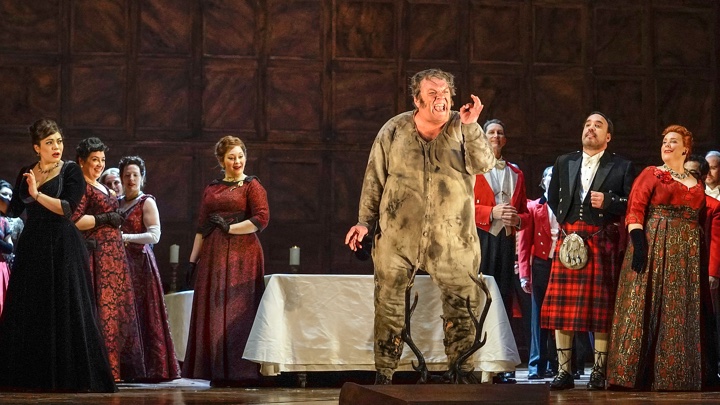
The staging is guided by an unerring sense of what stage pictures are inherently funny. It’s funny, for example, when there’s a horse on stage. It’s funny when a man is dressed like a cowboy. It’s funny when too many guys cram into the same kitchen.
Sight gags abounded, ranging from the broad (Falstaff shoots a gun and bits of ceiling rained down from the top of the stage) to the precise (Alice and Meg disappear from the windows through which they had been eavesdropping in perfect unison with the horse). Purists (i.e., haters) might find this constant barrage of jokes distracting.
Ever so occasionally, it was. But opera is not the easiest medium to make laugh-out-loud funny, and the cavernous Met is certainly not the easiest house for comedy. This Falstaff was really, truly, genuinely funny—funny in ways I haven’t seen much at the Met.
To its further credit, the production is not pure schtick, but genuinely thoughtful in its setting. Falstaff is based on The Merry Wives of Windsor, Shakespeare’s only play set in the England of his own time. Carsen’s production transposes the opera’s action from the then-burgeoning 16th century English suburbs to those of post-WWII, using the the latter to lend legibility to the former.
Like the early modern Merry Wives, this post-war Falstaff is concerned with gendered control over domestic spaces. The oppressively masculine dark wood paneling that dominates the opera’s first act, for example, contrasts starkly with the lemon-yellow Formica of Alice’s kitchen.
When, in the final scenes, the paneled walls are pried away, revealing a glittering night sky, the glimpse of a natural world beyond the previous acts’ tightly-controlled interiors is shocking. Like the climactic masque, the set’s release opens a way to the final fugue’s equalizing ridicule, in which cast and audience alike are united in foolishness.
Indeed, the cast was united throughout; with scads of chemistry, and the ability to combine sensitive vocal performances and intelligent comedic performances, the ensemble cast of Falstaff was a delight. As Alice, Ailyn Pérez looked at her broader, more outrageous scene partners—Michael Volle’s Falstaff, Marie-Nicole Lemieux’s Quickly—with a reactive, ironic eye.
Vocally, she was able to shade this ironic remove into lyrical sincerity with extreme precision. In the letter scene, for example, from phrase to phrase Pérez’s voice shifted from the glittering lyricism of a lover who is not yet ready to cede the field of romanticism and desire to the sly warmth of a wife who knows how transactional romance can be.
Volle’s Falstaff was neither romantic nor warm, in tone or in bearing—in fact, he was a little menacing, a genuine danger amongst the froth and the farce, with a voice somehow drier and colder than one might expect for an Italian comedic role. He had, however, charisma larger even than his fat suit (courtesy of costume designer Brigitte Reiffenstuel), impeccable comic timing, and a naturalistic delivery that gave him easy command of the stage and kept the audience laughing.
As the jealous husband Ford, Christopher Maltman similarly wedded comedic timing to an edge of something more dangerous. To the audience, Ford may be a comic role—particularly when he is dressed in a cowboy suit and a mullet wig, as he is here—but to Ford himself, the action could not have higher stakes.
Maltman was not afraid to ham it up in disguise as Fontana, but he played his aria with all the wounded pride of a tragic hero, finding, like Pérez and Volle, the undercurrents of dramatic feeling that run through this comic opera.
Set against the emotional complexity of Falstaff’s older characters and singers, Bogdan Volkov and Hera Hyesang Park as the young lovers Fenton and Nanetta were a little less impressive—while both were charismatic and fully committed performers, Volkov’s voice had a tendency to get swallowed in ensemble singing, and Park’s high notes had an ever-so-slightly wobbling quality. Still, they cut such appealing figures onstage as to be fairly irresistible.More irresistible still was Daniele Rustioni, whose conducting was surely the secret ingredient that lent this already accomplished ensemble cast that certain extra something. As dynamic on the podium as the sound he got from the performers (at times he seemed from my vantage point to be jumping up and down with excitement), Rustioni had the singers and orchestra in fine form, and the audience eating out of his hand.
Taking the stage for their curtain calls, Rustioni and the cast of Falstaff seemed aware of the magic they had created; they grinned, danced, teased each other and the audience, inviting us to share in the radically giddy message of the opera’s finale: “The whole world is a joke… but he who laughs last has the best laugh of all!”
Photo: Karen Almond / Met Opera
